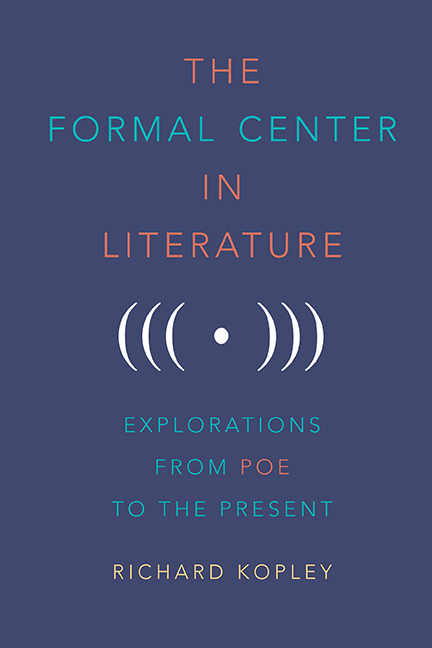Book contents
- Frontmatter
- Dedication
- Contents
- Acknowledgments
- Introduction
- 1 “Mournful and Never-Ending Remembrance” in Edgar Allan Poe's The Narrative of Arthur Gordon Pym
- 2 Retracing Our Steps in Edgar Allan Poe's “The Man of the Crowd”
- 3 “Scrutinizing the Parchment More Closely”: The Form of “The Gold-Bug” and Its Relationship to That of the Dupin Tales
- 4 Form and Reform in Nathaniel Hawthorne's “Earth's Holocaust”
- 5 The Circle and Its Center in Herman Melville's “Bartleby, the Scrivener”
- 6 Chiasmus in Henry David Thoreau's Walden
- 7 The Mythological Centers of Lewis Carroll's Alice Books
- 8 Table as Text in James Joyce's “The Dead”
- 9 The Structure of Sherwood Anderson's “Hands”
- 10 The Architecture of Ernest Hemingway's “The Three-Day Blow”
- 11 Balance in Dashiell Hammett's The Maltese Falcon
- 12 Framing Caesar in Raymond Chandler's The Big Sleep
- 13 The Ridge of the Domino in Patricia Highsmith's Strangers on a Train
- 14 The “X in the Air” in Joyce Carol Oates's “Where Are You Going, Where Have You Been?”
- 15 The Hybrid Center of Zadie Smith's White Teeth
- Notes
- Bibliography
- Index
15 - The Hybrid Center of Zadie Smith's White Teeth
Published online by Cambridge University Press: 14 June 2019
- Frontmatter
- Dedication
- Contents
- Acknowledgments
- Introduction
- 1 “Mournful and Never-Ending Remembrance” in Edgar Allan Poe's The Narrative of Arthur Gordon Pym
- 2 Retracing Our Steps in Edgar Allan Poe's “The Man of the Crowd”
- 3 “Scrutinizing the Parchment More Closely”: The Form of “The Gold-Bug” and Its Relationship to That of the Dupin Tales
- 4 Form and Reform in Nathaniel Hawthorne's “Earth's Holocaust”
- 5 The Circle and Its Center in Herman Melville's “Bartleby, the Scrivener”
- 6 Chiasmus in Henry David Thoreau's Walden
- 7 The Mythological Centers of Lewis Carroll's Alice Books
- 8 Table as Text in James Joyce's “The Dead”
- 9 The Structure of Sherwood Anderson's “Hands”
- 10 The Architecture of Ernest Hemingway's “The Three-Day Blow”
- 11 Balance in Dashiell Hammett's The Maltese Falcon
- 12 Framing Caesar in Raymond Chandler's The Big Sleep
- 13 The Ridge of the Domino in Patricia Highsmith's Strangers on a Train
- 14 The “X in the Air” in Joyce Carol Oates's “Where Are You Going, Where Have You Been?”
- 15 The Hybrid Center of Zadie Smith's White Teeth
- Notes
- Bibliography
- Index
Summary
ZADIE SMITH, IN HER ESSAY “Rereading Barthes and Nabokov,” describes her attraction, in college, to Roland Barthes’ death-ofthe- author hermeneutics, and her later turn to Vladimir Nabokov's author-as-sovereign model. She concludes, “To speak for myself, I've changed my mind.” Her yielding the freedom of the reader for communion with the author may shed light on her first novel, White Teeth, which seems to dramatize what Smith terms “the famous ideological debate.”
She writes in this essay that those students who were aligned with Barthes were “excited to add to the text's sudden indeterminacy, their own indeterminacy as well.” Perhaps here we have an anticipation of indeterminacy in White Teeth, from Archie Jones's making decisions by flipping a coin, to his daughter and granddaughter's having been born with an uncertain paternity. Smith writes, too, that those aligned with Nabokov considered Barthes's essay “The Death of the Author” to be “a perverse assault on the privileges of authorship, on the possibility of fixed meaning, even upon ‘Truth’ itself.” Perhaps here we have a shadowing forth of determinacy in White Teeth, extremes of which are embodied by Nazi geneticist Dr. Marc-Pierre Perret, his disciple Marcus Chalfen, and Fundamentalist Millat Iqbal. No resolution is offered in the novel, but our sympathies are with the indeterminate. The aleatory is less alienating than the absolute.
But in terms of reading, it is the Nabokovian side that Smith ultimately prefers: her own judgment finally is, “The house rules of a novel, the laying down of the author's peculiar terms—all of this is what interests me. This is where my pleasure is.” Accordingly, we may approach her novel White Teeth by investigating its “house rules.”
We are initially assisted by Matthew Paproth, who observes that “While Smith's outlook may be postmodernist in its rejection of absolutes, her novels are determinedly modernist in their construction.” He elaborates, “White Teeth consists of four sections of similar length, each of which contains five chapters, begins with an epigraph, centers on a different character, and focuses on two different years.” Although Smith disparages the scaffolding of a work in “That Crafty Feeling,” that scaffolding is clearly present in White Teeth. Paproth examines the table of contents particularly, which “makes visible Smith's interest in constructing a web of parallels and correspondences among the four parts of her novel.”
- Type
- Chapter
- Information
- The Formal Center in LiteratureExplorations from Poe to the Present, pp. 122 - 130Publisher: Boydell & BrewerPrint publication year: 2018

